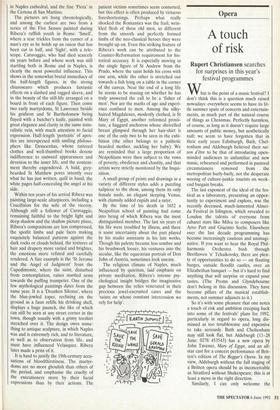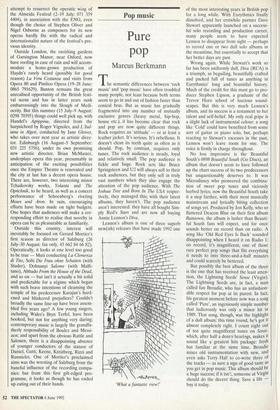Opera
A touch of risk
festival programmes
What is the point of a music festival? I don't think this is a question much raised nowadays: everywhere seems to have its lit- tle summer spate of concerts and entertain- ments, as much part of the natural course of things as Christmas. Perfectly harmless, of course, as long as it doesn't require large amounts of public money, but aesthetically null: we seem to have forgotten that in their early years Edinburgh, Bath, Chel- tenham and Aldeburgh believed their rai- son d'etre to be that of introducing open- minded audiences to unfamiliar and new music, rehearsed and performed in pastoral circumstances removed from the metropolitan hurly-burly, not the desperate wooing of culture-junkie tourists on week- end bargain breaks.
The last exponent of the ideal of the fes- tival as a laboratory, presenting an oppor- tunity to experiment and explore, was the recently deceased, much-lamented Almei- da Festival in Islington, which revealed to London the talents of everyone from cabaret stars like Milva to composers like Arvo Part and Giacinto Scelsi. Elsewhere over the last decade programming has become increasingly cautious and unimagi- native. If you want to hear the Royal Phil- harmonic Orchestra bash through Beethoven 'n' Tchaikovsky, there are plen- ty of opportunities to do so — on floating barges, outside floodlit castles, over an Elizabethan banquet — but it's hard to find anything that will surprise or expand your tastes. (The Proms and Glyndebourne don't belong in this discussion. They have become pillars of the musical establish- ments, not summer adjuncts to it.)
So it's with some pleasure that one notes a touch of risk and ambition creeping back into some of the festivals' plans for 1992, particularly in regard to opera, long dis- missed as too troublesome and expensive to take seriously. Bath and Cheltenham may still look flat, but Aldeburgh (11-28 June: 0278 453543) has a new opera by John Tavener, Mary of Egypt, and an all- star cast for a concert performance of Brit- ten's edition of The Beggar's Opera. In my view, Aldeburgh without the full staging of a Britten opera should be as inconceivable as Stratford without Shakespeare; this is at least a move in the right direction.
Similarly, I can only welcome the attempt to resurrect the operatic wing of the Almeida Festival (2-19 July: 071 359 4404), in association with the ENO, even though the choice of Stephen Oliver and Nigel Osborne as composers for its new operas hardly fits with the radical and internationalist nature of the festival's pre- vious identity.
Outside London, the ravishing gardens of Garsington Manor, near Oxford, now have roofing in case of rain and will accom- modate a home-grown production of Haydn's rarely heard (possibly for good reason) La Vera Costanza and visits from Opera 80 and Pimlico Opera (19-28 June: 0865 791629). Buxton remains the great unrealised opportunity of the British festi- val scene and has in latter years sunk embarrassingly into the Slough of Medi- ocrity. But this summer (15 July-9 August: 0298 70395) things could well pick up, with Handel's Agrippina, directed from the harpsichord by Roger Vignoles, and L'Ital- iana in Algeri, conducted by Jane Glover, who takes over next year as artistic direc- tor. Edinburgh (16 August-5 September: 031 225 5756), under its own promising new artistic director, Brian McMaster, underplays opera this year, presumably in anticipation of the exciting possibilities once the Empire Theatre is renovated and the city at last has a decent opera house. There are, however, two interesting minor Tchaikovsky works, Yolanta and The Oprichnik, to be heard, as well as a concert performance of Schoenberg's riveting Moses and Aron. In sum, encouraging efforts have been made on tight budgets. One hopes that audiences will make a cor- responding effort to realise that novelty in opera can be as pleasurable as familiarity.
Outside this country, interest will inevitably be focused on Gerard Mortier's first season as director of Salzburg (26 July-30 August: fax only, 43 662 84 66 82). Operatically, it looks at one level too good to be true — Muti conducting La Clemenza di Tito, Solti Die Frau ohne Schatten (with Studer), Dohnanyi Salome (with Malfi- tano), Abbado From the House of the Dead, and so on — but isn't it actually a bit solid and predictable for a regime which began with such brave intentions of cleansing the temple of his predecessor Karajan's hard- ened and blinkered prejudices? Couldn't broadly the same line-up have been assem- bled five years ago? A few young singers, including Wales's Bryn Terfel, have been booked, but not for anything very daring; contemporary music is largely the grandfa- therly responsibility of Boulez and Messi- aen; and apart from the obvious Rattle and Salonen, there is a disappointing absence of younger conductors of the stature of Daniel, Gatti, Keene, Kreizberg, Rizzi and Runnicles. One of Mortier's proclaimed aims was the wresting of Salzburg from the baneful influence of the recording compa- nies: but from this first gilt-edged pro- gramme, it looks as though he has ended up eating out of their hands.



































































 Previous page
Previous page